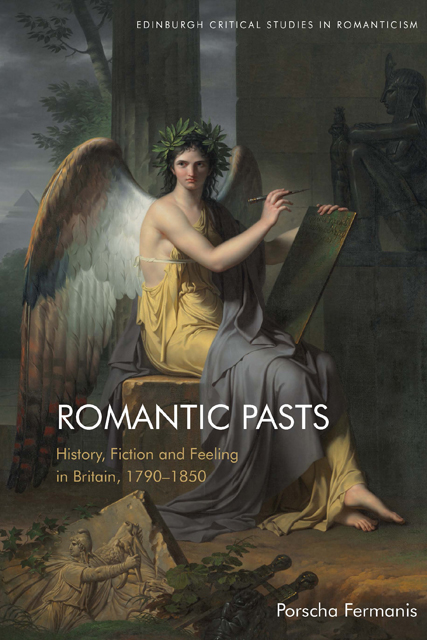Book contents
- Frontmatter
- Contents
- Acknowledgements
- Abbreviations
- Miscellaneous Frontmatter
- Introduction: Romantic Histories of Feeling
- 1 Historical Sentiment and Experience: Burke and Wollstonecraft
- 2 Historical Subjects and Ethical Character: Godwin and Carlyle
- 3 Historical Ethnogenesis and National Feeling:Scott, Moore, and Southey
- 4 Historical Style and the Man of Letters: Macaulay and Carlyle
- 5 Historical Reviewing: Specialisation and Periodical Culture
- Epilogue: A Romantic Return?
- Notes
- Bibliography
- Index
Introduction: Romantic Histories of Feeling
Published online by Cambridge University Press: 18 November 2022
- Frontmatter
- Contents
- Acknowledgements
- Abbreviations
- Miscellaneous Frontmatter
- Introduction: Romantic Histories of Feeling
- 1 Historical Sentiment and Experience: Burke and Wollstonecraft
- 2 Historical Subjects and Ethical Character: Godwin and Carlyle
- 3 Historical Ethnogenesis and National Feeling:Scott, Moore, and Southey
- 4 Historical Style and the Man of Letters: Macaulay and Carlyle
- 5 Historical Reviewing: Specialisation and Periodical Culture
- Epilogue: A Romantic Return?
- Notes
- Bibliography
- Index
Summary
In a wry reproach to the cloistered philosopher towards the end of his four-volume History of the Commonwealth of England (1824–8), William Godwin argues that feeling is a more central concern for the historian than it is for the abstract thinker or political theorist. The comparative ease with which the philosopher can ‘invent imaginary schemes of policy, and … shew how mankind, if they were without passions and without prejudices, might be best united in the form of a political community’ is inimical to the aims and methods of the historian, who must instead acknowledge that ‘men in all ages are the creatures of passions, perpetually prompting them to defy the rein, and break loose from the dictates of sobriety and speculation’. Such passions, Godwin concludes, not only render historical actors ‘very unlike the pieces on a chess-board’, but also demand that the historian go beyond any general laws of human nature to account for each individual's psychological and social distinctiveness, taking into ‘his estimate the materials of which they are made’ and dynamically ‘adapting his proceedings to their internal modifications’.
Part of his ongoing—indeed lifelong—revision of the rationalist principles outlined in An Enquiry Concerning Political Justice (1793), Godwin's somewhat belated insistence that feelings matter and that they ought to be recorded in written history raises some of the key questions addressed by this book. How could history remediate abstract philosophic ideas and general laws, and subject them to concrete experiential and evidentiary proof? When and how did historians come to understand human behaviour, and its cognitive and sensory underpinnings, as central to capturing the truth of the historical past? How, if at all, did they account for the changing norms, practices, and representations of feeling they discovered in their various studies? How did they access or recover the agency and subjectivity of historical actors and interpret the expression of feelings in historical documents and artefacts? And how did they actualise or represent historical shifts in emotional life in rhetorical and textual forms, from the inner life of individuals to the emotional economies of crowds, collectives, and institutions?
- Type
- Chapter
- Information
- Romantic PastsHistory, Fiction and Feeling in Britain, 1790-1850, pp. 1 - 29Publisher: Edinburgh University PressPrint publication year: 2022

